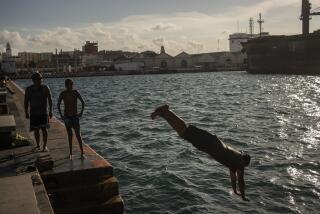France Says Up to 3,000 Have Died in Heat Wave
- Share via
PARIS — France’s heat wave has caused an estimated 1,500 to 3,000 deaths, French health officials said Thursday, as they fended off accusations that the government had reacted too slowly to the crisis.
With hospitals and morgues swamped, Prime Minister Jean-Pierre Raffarin and some of his Cabinet ministers hurried back from their August vacations Thursday for a crisis management meeting.
Raffarin had already ordered officials Wednesday night to enact emergency response measures in the Ile de France region that encompasses Paris. The so-called “white plan” was designed to respond to mass casualties resulting from natural disasters or terrorist attacks.
Other sweltering regions -- including Lyon, the nation’s second-biggest city -- followed suit Thursday by enacting the plan, which places hospital and medical personnel on emergency footing and frees up hospital beds and urgent-care facilities.
Health Minister Jean-Francois Mattei acknowledged that the effect of this month’s sustained heat wave had been far deadlier than first imagined, describing an “epidemic” of heat-related deaths that he estimated at between “1,500 and 3,000.” Many of the victims have been elderly or infirm.
The crisis is not over, Mattei said in a television interview Thursday, adding that the government was on “maximum alert.”
The Health Ministry said the deaths were “directly or indirectly” related to the heat, and it cautioned that precise numbers still had to be determined. Morgues and funeral parlors have been overwhelmed by cadavers in recent days.
Representatives of a doctors union were among those who accused the government of not doing enough. Patrick Pelloux, the president of the Emergency Room Doctors Assn., called for Raffarin to order a nationwide state of emergency.
The crisis response plan “must be initiated everywhere, or the difficulties of capacity will saturate the emergency rooms,” Pelloux said. “It’s our only chance to respond to the gravity of the situation.”
Mattei, smarting from criticism for having made his first comments about the crisis while still on vacation, responded: “We put all the service on alert, and we reacted when it had to be done. I have no reproach or regrets, because we have really done what was needed as fast as possible.”
In addition to temperatures that shot past 100 degrees and broke records, other factors appear to have contributed to a bad situation that blindsided the government. Because officialdom all but shuts down in France and other European countries during August, the health authorities were understaffed and unprepared, critics said. Similarly, some victims died alone in apartment buildings that were virtually deserted as most tenants went on vacation.
The widespread absence of air conditioning in France also played a role. Elderly people suffering from heatstroke were often taken to sweatbox hospitals that, like many public buildings in France, do not have cooling systems. An ingrained aversion to chilly drafts, an apparent tolerance for perspiration and an unwillingness to spend money to modernize have prevailed for years, although purchases of air conditioners have shot up this brutal summer.
Many restaurants, subways, stores and other public places still rely on little more than open windows and ancient fans to beat the heat. This inconveniences younger people, but for those older, there can be grave risks as well.
More to Read
Sign up for Essential California
The most important California stories and recommendations in your inbox every morning.
You may occasionally receive promotional content from the Los Angeles Times.













